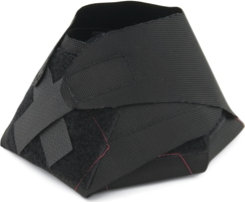I'm not real fond of getting calls at night saying "I think somethings wrong with my horse". It's not the call or the time of night, it's just hard to talk to people over a phone and translate what they are seeing. With some Vet bills for a night or weekend colic call being several hundreds of dollars, several people I know call me or my wife to help.
Colic is always bad news because the symptoms are sometimes misread or misleading and the threat to the horse is high. I have always wanted to film a colic case, but usually have my hands full doing something else and too worried about the horse to remember about a camera. Plus it always seems like horse colic always starts on a Friday night through Sunday night, don't it?
"The horse don't seem right" is often the first indicator of colic. Sometimes the horse's action just seem different. Sometimes it may be listlessness that gets our attention. Other signs include: horse not interested in feed; standing stretched out like when a horse urinates; ears focused backward; biting marks on the side; laying down, standing up and laying down again; in bad cases with alot of pain the horse will throw themselves down on the ground and this of course can result in a twisted gut which without immediate surgery is almost always fatal.
Before they lay down or throw themselves down Horses will usually walk around in a circle with their head down....like they would when they are trying to find a place to roll. I have a horse who seems to get gas colic more often than other horses, so one day I was lucky enough to have a video camera nearby and had someone shoot film on the horse's action to better explain some colic symptoms.
Other symptoms include tail wringing which indicates aggravation; lack of gut sounds on the horse's barrel when you place your ear to the gut; and, overly sweating can also indicate the horse is in distress.
Treatment for colic may include calling the vet and relaying what you are seeing - the more accurately you can provide descriptions on what the horse is doing, the better decisions the Vet can make; getting a halter on the horse and walking it around but don't over walk it as you can dehydrate it more and take needed blood flow away from the gut. This also keeps the horses from trying to throw itself down and in bad cases the horse will balk under halter and try to go down, so you have to create a little energy to keep the horse upright. If they stop and want to stand quiet during periods of reduced pain then I'll encourage this.
Banamine which is a muscle relaxer, usually given as 1cc per 100 lbs of body weight, can help. Best to get it into the horse via a vein (IV) as opposed to into the muscle (IM). If your Vet tells you to give your horse a shot of Banamine, note the time and amount to relay to your Vet.
Offering the horse a chance to drink occasionally is a good idea. And if the Vet comes out, normal protocol after an exam is to put a tube through the nose to the gut and pump mineral oil and water into the stomach. The exam usually includes palpitating the last few feet of the horses digestive tract with a gloved arm to check for impaction or a twisted gut. Some Vets will also suggest an IV line into the horse to keep it hydrated and giving the horse a mineral oil/water enema.
The weather's getting hotter now. Here in West Texas it hit 99 degrees yesterday. Make sure to monitor your horse's water intake and always provide clean water and plenty of it to drink. Keep a barrier between your horse's feed and the ground especially if the ground is sandy. Keep your horses wormed on schedule. All this can reduce the chances of colic, but know what to look for because time is very important in the treatment. Safe Journey.


















No comments:
Post a Comment